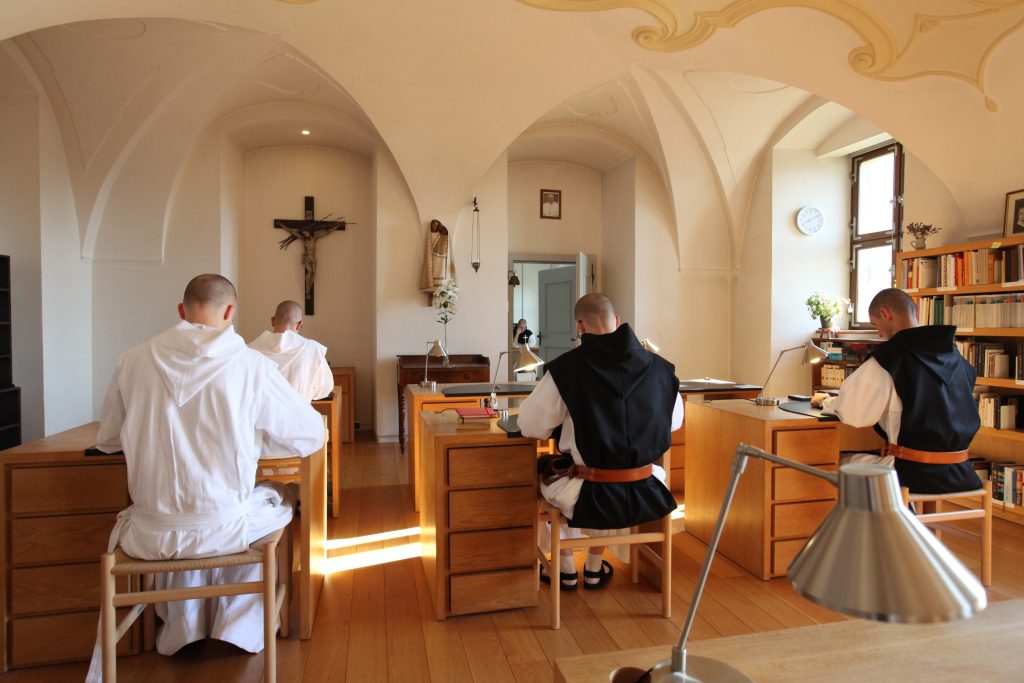Vocation and monastic training

Monks are men like other men, but a call from God has wrested them from their personal plans and turned them towards Jesus Christ. This call is a great mystery, not least to the monks themselves. If you find grandeur in monastic life, do not admire those who live it, as they live it poorly.
“Jesus told him, “Follow me”
(Gospel of Matthew 8:22)
The call of God is usually tender and discreet, giving each person the freedom to respond. Discerning and encouraging the vocation of those visiting the monastery and asking this question, is not an easy task. It requires us to be tactful, reserved and perspicacious, as answering a vocation is always demanding. But God promises those he calls that he will support them, accompany them and, through their faithfulness, bless “all peoples on earth”.
“The Lord said to Abraham: Leave your country, your family, and your father’s home for a land that I will show you. I will make a great nation from you. I will bless you and make your name famous; people will use your name to bless others. I will bless those who bless you […] All peoples on earth will be blessed through you.”
(Genesis 12:1-3)
Discerning vocation is one of the objectives of the initial training. The initial years of monastic life consist of building on the rock. Monks must learn to walk in the steps of God, increasingly aware of the fact that their service is flawed. They discover hidden riches in Him and learn that the feelings of helplessness and deficiency that God leaves in them do not obstruct the path that Lord Jesus has traced in their hearts.
“Therefore, everyone who listens to these messages of mine and puts them into practice is like a wise man who built his house on a rock. The rain fell, the floods came, and the winds blew and beat against that house, but it did not collapse because its foundation was on the rock.”
(Gospel of Matthew 7:24-25)
A (young) man knocks at the door of the monastery, expressing his desire to become a monk. He takes part in community life and, after several stays in the community, becomes an “observer” and then, after several months in the community, a postulant for around one year and sometimes more. Once the postulant period is completed, if he so requests and if his vocation appears genuine, he is given the novice’s habit. For the following two years, the novice learns both the human and spiritual aspects of life in the monastery. During a period of three years, he can then pronounce his first vows of stability in the monastery, of conversion of morals and obedience. Saint Benedict encompasses the vows of poverty and chastity in the magnificent expression “conversion of morals”, which can be understood as the monk vowing to live in the monastery according to the Cistercian way of living, tirelessly seeking conversion and not becoming complacent, whilst remaining vigilant – a tranquil vigilance – for the service of the Lord. Once these three years are completed, the young monk can then pronounce his permanent solemn vows.
Monastic training takes place over a long time, living in the monastery and listening to the teachings of the Abbot. This process is facilitated by frequent discussions with the Master of Novices and other experienced monks. It is based on daily practice of the Rules of Monks and the monastic tradition adapted to contemporary needs.
“Listen carefully, my son, to the master’s instructions, and attend to them with the ear of your heart. This is the advice from a father who loves you; welcome it, and faithfully put it into practice. The labour of obedience will bring you back to him from whom you had drifted through the sloth of disobedience. This message of mine is for you, then, if you are ready to give up your own will, once and for all, and armed with the strong and noble weapons of obedience to do battle for the true King, Christ the Lord.”
(Saint Benedict, Rule for Monks, Prologue)
“One day, someone asked Abba Paesios, “What should I do with my soul, because it is insensitive and does not fear God?” He said to him, “Go and join a man who fears God and live near him: he will teach you, too, to fear God.”
(The Sayings of the Desert Fathers, Abba Poemen)
Cistercian life, in the spirit of the founders of the New Monastery in Cîteaux in 1098, has specific characteristics, namely simplicity, contemplation, a life of prayer and silence and a fraternal life that enables each monk to fulfil their vocation with the support of others.
“By fidelity to their monastic way of life, which has its own hidden mode of apostolic fruitfulness, monks perform a service for God’s people and the whole human race.”
(Constitutions of the Order of Cistercians of the Strict Observance)
Monks in training follow lessons given in the monastery, in particular on Holy Scriptures, philosophy and dogmatic and spiritual theology. They are given by teachers from outside the monastery, who are Czech, Slovak, Polish and French. Dominicans from the province of Bohemia have also been assisting with training since the monastery was founded. Intellectual training can lead to sitting a baccalaureate exam in theology and some brothers continue their studies to degree level in theology or philosophy.
In their monastic vocation, monks fulfil the gifts of their baptism in a way that is individual to each monk. Through their hidden lives, they exercise their baptismal priesthood without a direct apostolate, in close union with Christ. Those who are called to the ministerial priesthood are ordinated a few years after their solemn profession. This second vocation forms an integral and harmonious part of monastic life, in which everyone has their place in the Church by living at one with Christ.